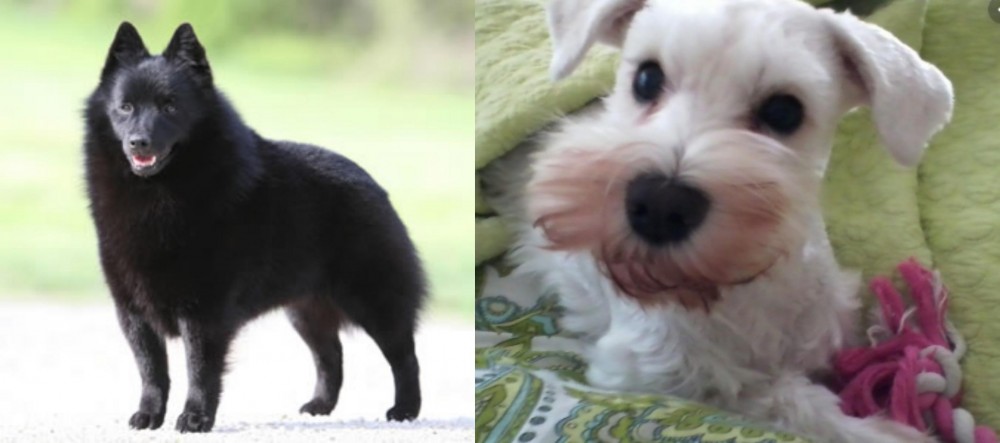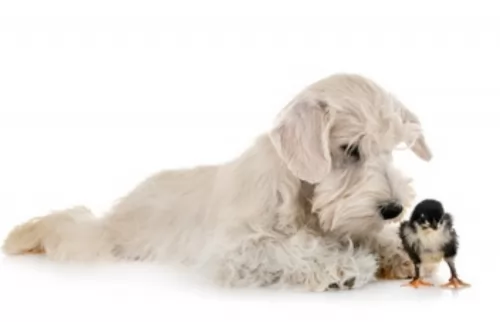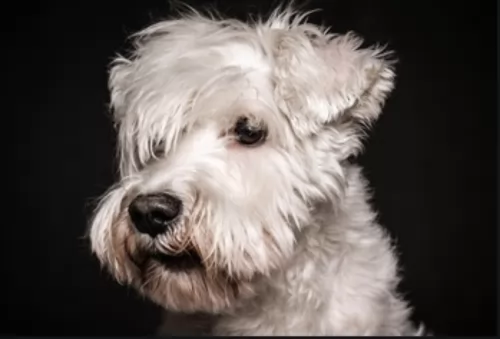 Petzlover
Petzlover Schipperke is originated from Belgium but White Schnauzer is originated from Germany. Both Schipperke and White Schnauzer are having almost same height. Both Schipperke and White Schnauzer are having almost same weight. Both Schipperke and White Schnauzer has almost same life span. Both Schipperke and White Schnauzer has almost same litter size. Schipperke requires Low Maintenance. But White Schnauzer requires Moderate Maintenance
Schipperke is originated from Belgium but White Schnauzer is originated from Germany. Both Schipperke and White Schnauzer are having almost same height. Both Schipperke and White Schnauzer are having almost same weight. Both Schipperke and White Schnauzer has almost same life span. Both Schipperke and White Schnauzer has almost same litter size. Schipperke requires Low Maintenance. But White Schnauzer requires Moderate Maintenance
 The Schipperke is a small dog which hails from Belguim and where he is known as a Spitz.
The Schipperke is a small dog which hails from Belguim and where he is known as a Spitz.
There are however different theories regarding the Schipperke’s origin. It was however during the late 1800s, that Belgian Schipperke fanciers set a standard for the breed.
It was in 1888 that the first Schipperke was imported to the United States and a specialty club for the breed founded in 1905.
 The White Schnauzer was established in Germany in 2006 for people looking for this particular breed of dog but in white.
The White Schnauzer was established in Germany in 2006 for people looking for this particular breed of dog but in white.
The traditional color is salt and pepper. It seems that breed societies don’t allow the white breed, saying they don’t conform to the ideal breed standard.
The White Schnauzer is officially recognized in Germany, If you have a White Schnauzer you may not be able to show him with some of the major kennel clubs.
White is one of the four color varieties of the Miniature Schnauzer and it is also recognized by the Fédération Cynologique Internationale.
 This little Belgian dog stands at between 25 and 33cm in height and weighs between 3 and 9kg.
This little Belgian dog stands at between 25 and 33cm in height and weighs between 3 and 9kg.
The double coat of the dog is fairly short, but thick and it comes in a range of colors, but always solid, from chocolate to apricot to black.
A typical characteristic of his is the longer-haired ruff around his neck. He also has this longer hair around the hind legs. He has sharp, erect ears and the tail is a natural bobtail or long. Most people choose to have the tail docked.
These little dogs are no pushover. He is stubborn, strong-willed and confident. They are lively, intelligent, curious and energetic and will require plenty of exercise.
Small though he is, he will certainly need training and socialization, otherwise he just goes his own way. Training him will ensure he is obedient and not so strong-willed. They get on well with children, but they tend to be aggressive with other dogs that they haven’t grown up with.
Bring him up the right way and he makes a splendid pet.
 There are a number of different types of White Schnauzer. The white Schnauzer is actually one of 4 color varieties and these dogs are always miniature Schnauzers.
There are a number of different types of White Schnauzer. The white Schnauzer is actually one of 4 color varieties and these dogs are always miniature Schnauzers.
You won’t easily find a Standard- or Giant dog in white. They aren’t albinos, as the skin does have some pigment.
These dogs also have that square-shaped build and they stand between 28 to 36 cm in height and weigh between 4 and 7kg.
The coat is wiry with a soft undercoat. The ears are often cropped to stand erect, but if left they are half-erect, half-floppy and fold forward.
The White Schnauzer is an intelligent dog who will be able to be socialized and trained easily.
He is an energetic little dog and very playful and will get along well with children, loving the games they provide and loving to spend time with all members of his family.
He is loving and affectionate and is willing to share his home and people with other dogs too. He will make you a good watchdog, perhaps encouraged because of his reserve with strangers.
If you provide him with the right amount of mental and physical stimulation, he can become a balanced dog with an amicable personality.
 With his bright little face, the Schipperke dog is a surprising dog, being fearless, confident, protective and devoted – everything people looking for in an excellent pet want.
With his bright little face, the Schipperke dog is a surprising dog, being fearless, confident, protective and devoted – everything people looking for in an excellent pet want.
His small size makes him able to slot into life in the city or the countryside. He is also looked upon as low maintenance. Add to this the fact that he is intelligent too. He is a feisty dog, and that’s why we say he is surprising because while he can be your sweet companion dog, he can turn into a robust, feisty, daring little panther. He’s got everything going for him to make you a splendid pet.
 The White Schnauzer is such an adaptable little dog and he will happily adapt to life in the city or in the countryside, just so long as he is close to his human companions and gets sufficient exercise.
The White Schnauzer is such an adaptable little dog and he will happily adapt to life in the city or in the countryside, just so long as he is close to his human companions and gets sufficient exercise.
He is a sociable dog that just loves to be around his human family and won’t like to be separated from them for too long.
He makes a great family dog when you provide him with the right food, a warm dry place to sleep, exercise and lots of love and attention.
 The Schipperke has no real health problems that he specifically gets, and he can live to be 13 years or older.
The Schipperke has no real health problems that he specifically gets, and he can live to be 13 years or older.
Over-feeding, bad food choices and lack of exercise are going to shorten the lifespan of this dog. Some dog illnesses to be aware of with the Schipperke is cancer, bloat, epilepsy, dental problems and luxating patella.
This is a condition where the knee cap of the dog moves out of its natural position. The patella moving out of the normal groove of the thigh bone can be because of genetic or traumatic reasons.
The symptoms of luxating patella include limping, skipping along as well as an abnormal sitting posture. Arthritis can also set in. Strangely, many small dogs live all their lives with luxating patella and they live like that free of pain. However for many other dogs it can mean pain and it can require surgery.
 While he is a spunky, robust type of dog, there are always going to be some health concerns to look out for.
While he is a spunky, robust type of dog, there are always going to be some health concerns to look out for.
Kidney stones may well not cause your pet the same pain that humans endure, but they are still a cause for concern. A kidney stone that gets too large and lodges in the ureter becomes a ureterolith. This can be very painful, resulting in pain and even vomiting.
The kidney can even swell and become damaged. Your dog could become critically ill, particularly because of the disrupted flow of urine.
Your pet will possibly have blood in the urine, fever, lethargy, poor appetite and weight loss. Veterinary-intervention will be imperative.
 Dry kibble is always a good choice for dogs as its helps to keep the dog’s teeth clean. You want to make sure you buy one of the best quality foods, full of minerals and vitamins as opposed to fillers, colorants and preservatives. The food you give your Schipperke can have a huge impact on his health.
Dry kibble is always a good choice for dogs as its helps to keep the dog’s teeth clean. You want to make sure you buy one of the best quality foods, full of minerals and vitamins as opposed to fillers, colorants and preservatives. The food you give your Schipperke can have a huge impact on his health.
Your puppy will require 4 meals a day but later this becomes 2 bowls of food. To add some variety to your pet’s diet, feed him some home made food occasionally which can be added to his dry kibble twice a week.
Boiled chicken, brown rice or pasta and spinach, sweet potatoes and carrots are a healthy choice for your Schipperke.
Try and include some raw meat into the diet as this can help in fighting off horrible skin diseases. Make sure he has constant access to fresh, cool water.
Ensure regular vet checks for your dog, particularly when he is showing signs of being sick.
Check your pet for ticks and fleas. Parasites can be very bad for your pet’s health. Your dog will need all his vaccines to stave off deadly canine illnesses.
Brush your Schipperke twice a week to make sure you get rid of loose hairs. A Schipperke doesn’t shed a lot.
Keep his nails trimmed. If you are unsure on how to do this, professional groomers can do this for you.
Ears and eyes should also be checked.
He’s an energetic little dog so make sure that he gets lot of excellent forms of exercise from walking to hikes to ball games, frisbee – you name it, you won’t tire him out easily.
 He is a low shedding breed so he will require a brushing just once a week. These dogs also have a certain professional grooming cut. Some schnauzer dog owners do stripping but this is mostly for show dogs.
He is a low shedding breed so he will require a brushing just once a week. These dogs also have a certain professional grooming cut. Some schnauzer dog owners do stripping but this is mostly for show dogs.
Most people just have them sheared to make it easy to groom them. Whether stripped or clipped, they nearly always have a beard and bushy eyebrows.
Trim your pet's nails and give him a general once-over during the grooming sessions to ensure all is well.
You White Schnauzer relies on you to make wise food choices for him. He will eat most things you offer him. That doesn’t mean you should as you can cause him to have a whole lot of digestive problems.
If you choose to give him commercially manufactured dog food, make sure its a high-quality one – devoid of toxic ingredients such as colorants, fillers and preservatives.
If you don’t know how to choose, your vet can show you the foods they have in stock and which would suit your pet best.
A little bit of home-made food now and then can also be good, but the food needs to be plain and simple to avoid abdominal pain. Boiled chicken brown rice and vegetables chopped up and added to the dry kibble occasionally can be a very good choice.